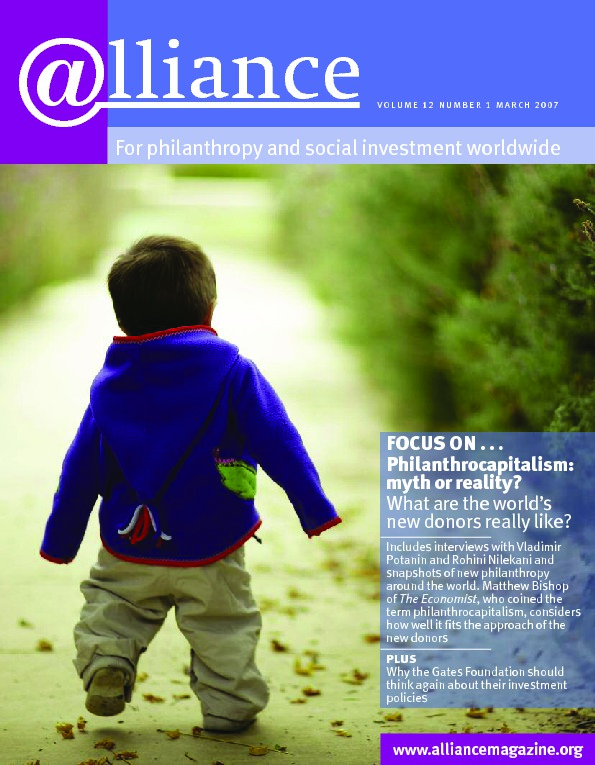Few would disagree that women bear the brunt of a vastly disproportionate share of global poverty. It is almost impossible for any development project to conceive of a strategy without considering the gender angle. As the last issue of Alliance demonstrated, gender also illuminates one of philanthropy’s many ‘shadow sides’, pointing up the fact that the voices of women are muted even within charities.
So I read the remarks made about feminism by Nilda Bullain and David Bonbright with some concern. Bullain fully acknowledges the place of gender on the philanthropic agenda. And she rightly underscores the tendency of some Western feminists to map their own experiences onto others, thus riding over the differing needs of local cultures. Yet the characterization of the Western feminist agenda as ‘politically correct’ and out of touch with ‘the vast majority of East European women who do not believe in “sisterhood”’ and who ‘do not feel “oppressed” or “victimized”’ seems to me unhelpful. The implication that feminism is purely a Western concern overlooks the existence of indigenous feminist movements working hard to articulate an alternative agenda. Surely the very real fact of gender discrimination in Eastern Europe demands a dialogue with – and not a dismissal of – Western feminists also concerned about securing the rights of women.
This impulse to define feminism by its stereotype in order to dismiss it also makes its way into a piece by David Bonbright. In his review of Anne Firth Murray’s book assessing the early years of the Global Fund for Women, Bonbright applauds what he sees as a ‘visionary’ effort to forge ‘a specific set of principles and guidelines for social organization from a feminist paradigm’. Yet he notes that ‘words like patriarchy, male domination and the like do not appear in the book’; instead we get a ‘positive’ picture of female empowerment. Thus ‘this book rises above the contest for power and aims for synthesis at a higher level’. But when was feminism ever about gaining ascendancy over men? This is the stuff of male imagination, not a feminist agenda.
The caricature that equates feminism in general with a supposedly worn-out set of concepts and slogans – ‘sisterhood’, ‘oppression’, ‘victimization’, ‘patriarchy’, ‘male domination’ – is itself becoming a cliché. Yet it is increasingly commonplace; feminism has long been a figure of fun, but many of its past achievements are now also being eroded. The Canadian Status of Women Minister’s recent decision to drop the word ‘equality’ from her programme’s mandate represents a worrying policy trend.
Concepts like ‘patriarchy’ and ‘male domination’ may not be indispensable for describing the experiences of women; but if they do seem ‘negative’, that’s probably because these experiences sometimes are extremely negative. And if the avoidance of such terms leads to a kind of feel-good factor that shines a light only on what’s ‘positive’, then it seems all the more important that they make their way back into the centre of a feminist vocabulary.
Anna Hartnell



Comments (0)